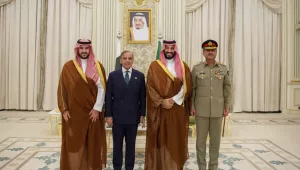This week’s extension in the negotiations between Iran and the P5+1 is a welcomed jolt of composure and realism in a process that for years has been characterized by wild allegations, emotional retorts and intemperate actions. The decision to extend talks and keep negotiating to achieve a final agreement by next summer seems to cement the decision to deal with the accusations of Iran’s alleged desire to obtain a nuclear bomb as a technical issue that has a technical solution, rather than a continuation of the tendency of the United States and Israel, primarily, to treat Iran as a hapless colonial subject.
Once the two sides started negotiating seriously last year, and placed their concerns, aspirations and rights on the table, it quickly became clear that an agreement was possible, but it would require serious mutual concessions. Two bottom line positions are absolutely non-negotiable, and reasonably so: Iran’s insistence on its right to enrich uranium for peaceful purposes, short of a bomb-making capability, and the P5+1 determination to prevent Iran from being able to assemble a nuclear bomb quickly and surreptitiously. These two requirements are absolutely reconcilable, and they will both frame and seal a final agreement when one is reached next year, one hopes.
For now, the extension decision reflects welcomed wisdom and rationality on both sides, and a deeper expectation that a final permanent agreement can be reached soon. For now, the maturity, patience and seriousness on both sides are impressive, and a far cry from the almost lunatic threats, insults and deprecations that had defined Iranian-American-Israeli exchanges in recent years. The change in tone all around is probably due to two main reasons — the need to resolve this matter so as to address the dangerous situations across the Middle East, especially in Syria-Iraq, and the realization that the cost of failure is too high all around. The precarious state of the Middle East has added urgency to the matter, because both Iran and the concerned foreign powers are deeply engaged and invested in the region, and vulnerable to retaliatory punitive mischief in case of failure.
The shift from political posturing and colonial confrontations to actually looking at the technical issues related to both the Iranian nuclear industry and the sanctions on Iran has allowed for the progress of the past year. We now know that all issues of concern to both sides can be addressed seriously and dispassionately, and disagreements gradually resolved, if hysterical positions and wild accusations are ignored in favor of focusing on practical reciprocal measures that meet the needs of both sides. Simultaneity and reciprocity of concessions, it is confirmed again, are critical elements for success.
This is a big loss for the Israeli position, and its supporters and pavlovian attack dogs in the US Congress, who would not consider any serious rollback of sanctions against Iran until they guaranteed that Iran would not have any enrichment capacity that could help it produce a nuclear bomb. In part because the primacy and political prioritization of exaggerated and unrealistic Israeli concerns were not allowed to shape the diplomatic dynamic, progress happened. (This lesson is relevant to the stalled Palestinian-Israeli peace negotiations, which remain moribund in large part because Israeli positions that enjoy American acquiescence dominate the negotiations, rather than a serious desire to respond to the legitimate rights of both Israelis and Palestinians. There is no more important lesson to learn in such situations than the fact that simultaneity and reciprocity rule in such negotiations.)
Decisive yet sensible leadership among those involved in the talks has been able to triumph over extremist ideological positions of domestic foes, and scare tactics of perturbed foreign parties like Israel and Saudi Arabia. In particular the continuing serious negotiations are a big blow to the power of the pro-Israel lobbies in Washington, D.C. that had argued for zero enrichment in Iran. This is another setback to the Zionist attempt to give Israel’s self-defined security concerns priority over the dictates of existing international law and conventions, whether related to nuclear proliferation, refugee rights, the Geneva conventions or other issues.
Iran also has provided an important lesson for the world on how a firm, law-and-legitimacy-anchored position on the right to enrich uranium for peaceful purposes can be vindicated, if a country does not allow itself to be bullied and threatened by primarily American-Israeli-driven accusations and assumptions that are rarely supported by hard, credible evidence. Self-respect is an effective diplomatic tool when one has facts at hand to reinforce one’s case, and agrees to address the legitimate needs of both sides simultaneously.
Rami G. Khouri is published twice weekly in the Daily Star. He was founding director and now senior policy fellow of the Issam Fares Institute for Public Policy and International Affairs at the American University of Beirut. Follow him on Twitter @ramikhouri.
Khouri, Rami. “Important Lessons from the Iran Negotiations.” Agence Global, November 26, 2014





